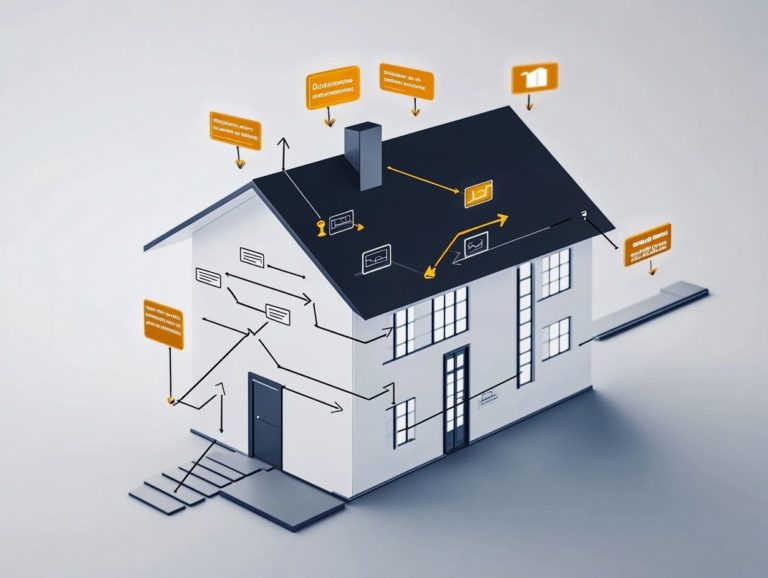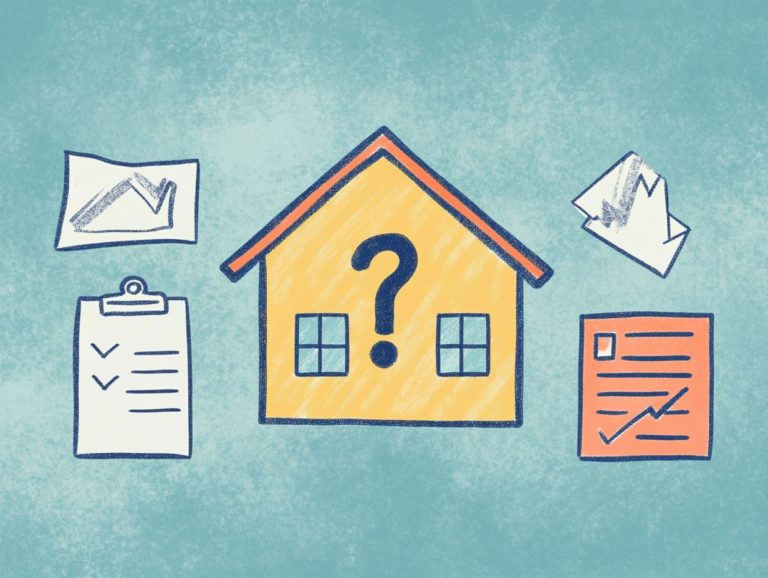5 Reasons to Refinance Your Mortgage Now
Refinancing your mortgage can truly transform your financial landscape. It presents a wealth of benefits that may lead to significant savings and an improved financial position.
This article explores five compelling reasons to consider refinancing right now, from lower interest rates to the possibility of consolidating your debt.
It also addresses essential questions about potential savings, the impact on your credit score, and the common misconceptions that often cloud the process.
Whether you want to lower your monthly payments or switch to a fixed-rate mortgage, this guide will help you evaluate if refinancing aligns with your financial goals.
Contents
- Key Takeaways:
- 1. Why Refinance Your Mortgage?
- 2. Key Benefits of Refinancing
- 3. How to Choose the Right Option for You
- 4. Cash-Out Refinancing Option
- 5. Consolidate Debt
- Is Now the Right Time to Refinance?
- What Are the Potential Savings from Refinancing?
- What Are the Qualifications for Refinancing?
- How Does Refinancing Affect Your Credit Score?
- What Are the Closing Costs for Refinancing?
- How Long Does the Refinancing Process Take?
- What Are the Risks of Refinancing?
- How Can a Homeowner Determine If Refinancing Is Worth It?
- What Are the Common Misconceptions About Refinancing?
- Preguntas Frecuentes
- Cu les son las 5 principales razones para refinanciar tu hipoteca ahora?
- C mo puede refinanciar reducir mi tasa de inter s?
- Cu les son los beneficios de refinanciar a un plazo de pr stamo m s corto?
- Puedo utilizar el refinanciamiento para obtener efectivo de mi hogar?
- Es el refinanciamiento una buena opci n para consolidar mis deudas?
- C mo puede el refinanciamiento ayudar a mejorar mi puntaje crediticio?
Key Takeaways:

Lower interest rates can save you thousands of dollars over the course of your mortgage, making now a prime time to refinance.
Refinancing can significantly lower your monthly payments, giving you extra cash for other expenses or savings.
Switching from an adjustable-rate mortgage to a fixed-rate mortgage provides stability and protects against future rate increases.
1. Why Refinance Your Mortgage?
Lower Interest Rates
Lower interest rates are a top reason homeowners consider refinancing their mortgage. This decision can enhance your overall financial health, leading to substantial long-term savings on interest payments.
When interest rates decrease, it provides a unique opportunity to lower the total yearly cost of borrowing money, including interest and fees (APR) on your existing loans. If you re thinking about refinancing, partnering with top lenders like Rocket Mortgage and Better Mortgage can streamline the process.
By securing a more favorable interest rate, you can reduce monthly mortgage payments and even shorten the loan term. This means you’ll pay less interest over the life of the loan. Improved cash flow allows you to allocate funds toward essential areas of your life whether it s investing in home improvements, saving for future endeavors, or simply enjoying a more comfortable lifestyle.
2. Key Benefits of Refinancing
Reduce Monthly Payments
Refinancing your mortgage can significantly lower your monthly payments. This gives you the ability to manage your cash flow more effectively while aligning your mortgage with your financial objectives.
Exploring various refinancing options like switching from an adjustable-rate mortgage to a fixed-rate mortgage can stabilize your monthly expenses and offer greater predictability in budgeting.
For example, if you re currently facing a variable rate that fluctuates, refinancing to a fixed rate can eliminate the fear of unexpected spikes in your payment amount. This could save you hundreds of dollars each month.
It’s crucial to assess your personal financial circumstances, such as income stability and future plans, to find the most beneficial strategy. Tailoring these options to your unique situation can enhance your financial security and provide peace of mind.
3. How to Choose the Right Option for You
Change from Adjustable Rate to Fixed Rate
Switching from an adjustable-rate mortgage (ARM) to a fixed-rate mortgage through refinancing offers you predictable monthly payments and protection against rising interest rates. This shift is especially beneficial during economic uncertainty when interest rates can be volatile.
By securing a fixed-rate mortgage, you can eliminate the stress of sudden payment spikes, allowing you to manage your budget more effectively and plan finances with confidence.
If you re a family looking to settle down in your current home for the long term, locking in a fixed rate shields you from potential market fluctuations. That peace of mind is invaluable, especially for those on a tight budget or with future investment aspirations.
You won t have to worry about unpredictable mortgage payments while juggling other financial responsibilities.
Take control of your finances today start your refinancing journey now!
4. Cash-Out Refinancing Option
Cash-out refinancing is a chance for homeowners to use their home equity. This gives you access to funds for home improvements, investments, or other financial needs.
In this process, you can replace your current mortgage with a new one at a higher amount. This lets you borrow against your home’s increased value.
You may enjoy lower monthly payments and overall interest costs. This financial strategy is great if you want to enhance your space, consolidate bills, or support education expenses!
5. Consolidate Debt

Refinancing can be a smart move for homeowners looking to combine debts. It allows you to manage multiple bills through a single lower-interest mortgage.
By merging high-interest debts, like personal loans or credit card balances, into your mortgage, you can lower your monthly payments. This process simplifies your payments into one easy mortgage payment.
It also improves your cash flow. You can redirect the extra funds toward savings or investments.
If you have several debts with high-interest rates, consolidating them into a lower-rate mortgage could save you hundreds each month. This strategy can lead to a more manageable financial outlook!
Is Now the Right Time to Refinance?
Deciding to refinance now depends on your financial situation, current interest rates, and potential savings. Assessing these factors can help you make informed decisions to improve your finances.
Stay updated on market trends and interest rate changes. These factors are crucial for determining if refinancing is a viable option for you!
Review your financial health, including your credit score and existing debts. This assessment will give insight into your refinancing opportunities.
Calculate your potential savings in monthly payments and overall loan costs. This could reveal significant benefits for your financial journey!
Consulting with a financial advisor is a wise step. They can provide a detailed review of your situation and guide you towards the best choices.
What Are the Potential Savings from Refinancing?
Refinancing can lead to significant savings, including lower monthly payments and reduced overall interest costs. However, these savings vary based on mortgage rates and lender terms.
For instance, a homeowner with a $200,000 mortgage at 4.5% interest could save over $200 a month by refinancing to a 3.5% rate. This translates to substantial savings over the loan’s life!
Choosing a shorter loan term, such as moving from a 30-year to a 15-year mortgage, might increase your monthly payments. However, this change can lead to lower total interest paid.
This example highlights the importance of evaluating all refinancing options. Each situation has unique benefits and long-term financial impacts that can significantly affect your savings!
What Are the Qualifications for Refinancing?
Qualifying for refinancing requires meeting certain criteria, including maintaining a good credit score and providing the necessary loan documentation. Each of these factors is vital in the refinancing process.
A solid credit score demonstrates your financial reliability and impacts the interest rates available to you. Be prepared with essential documents like income statements and tax returns.
By showing a responsible credit history and providing thorough documentation, you boost your chances of approval. This can lead to better loan terms and potential savings in the long run!
How Does Refinancing Affect Your Credit Score?
Refinancing can affect your credit score in complex ways. It may take a small hit initially due to hard inquiries, but it can enhance your score over time by reducing your overall debt obligations.
When you choose to change your mortgage, you re often looking to take advantage of lower interest rates or switch from an adjustable-rate mortgage to a fixed-rate option. This can make monthly payments more manageable.
While there could be a temporary dip in your credit score as new inquiries arise, managing your finances wisely can lead to an improved score as your total credit utilization decreases.
Keep in mind that refinancing may require mortgage insurance, which is a fee you pay to protect the lender if you can t make your payments. By maintaining a strong payment history and managing your other debts effectively, you can mitigate any negative effects. This ensures that your refinanced mortgage helps you build a stronger financial future.
What Are the Closing Costs for Refinancing?

When considering refinancing, understanding the associated closing costs is crucial. These expenses can significantly impact your finances and the savings you might achieve through refinancing.
Typically, these costs include:
- Appraisal fees, which determine your property’s current value,
- Lender charges for processing the loan,
- Title insurance to protect your ownership rights,
- Various miscellaneous fees that can add up quickly.
It’s essential to carefully evaluate these costs against the potential monthly savings from a lower interest rate or better loan terms. By calculating how long it will take to recoup these costs, you can make an informed decision about whether changing your mortgage aligns with your financial goals.
How Long Does the Refinancing Process Take?
The refinancing process can vary widely, often taking from a few weeks to several months. This timeline mainly depends on the approval process, the lender you choose, and how complete your loan documentation is.
To ensure a smoother transition, gather essential documents in advance like pay stubs, tax returns, and statements for any existing debts. Each lender has its own requirements, so double-checking the specifics can help you avoid unnecessary delays.
Factors like current interest rates, market conditions, and your credit score can significantly influence the refinancing timeline. Being well-prepared not only speeds up the process but also increases your chances of getting favorable terms.
What Are the Risks of Refinancing?
Refinancing can offer several benefits, but it’s important to recognize the risks involved. These include potential increases in your financial obligations, higher total loan amounts, or less favorable interest rates if you proceed without caution.
These risks become more pronounced when the decision to refinance is made impulsively or without sufficient research. A common mistake is extending loan terms, which might lower monthly payments but ultimately results in a higher total interest cost over the life of the loan.
Be cautious not to increase your debt load without addressing underlying financial issues. To navigate these risks effectively, it s imperative to have a meticulous plan.
This means considering your long-term money goals, evaluating current market conditions for interest rates, and consulting with a financial advisor to ensure that refinancing aligns seamlessly with your overall financial strategy.
Explore refinancing today and take a step towards financial freedom!
How Can a Homeowner Determine If Refinancing Is Worth It?
To determine if refinancing is worth it, assess your financial situation and evaluate potential savings. Consider how much home equity you have, which is the portion of your home you truly own.
This method helps you weigh refinancing costs against potential benefits, like lower monthly payments or reduced interest rates.
Consulting a financial adviser or mortgage lender can provide tailored insights. These experts can guide you through various refinancing options that fit your situation.
By following this approach, you can make informed decisions that lead to long-term financial stability.
What Are the Common Misconceptions About Refinancing?
Many homeowners mistakenly believe refinancing always saves money. In truth, it requires careful consideration of your financial goals.
Refinancing can sometimes lead to higher costs, especially if you extend loan terms or incur significant upfront fees. Comparing interest rates with your current rate is essential as even minor differences can affect your overall savings.
Mortgage lenders should provide clear, accurate information to navigate refinancing complexities. By debunking myths and focusing on real savings, you can align your decisions with your financial aspirations.
Preguntas Frecuentes

Cu les son las 5 principales razones para refinanciar tu hipoteca ahora?
Las 5 principales razones son tasas de inter s m s bajas, plazo de pr stamo m s corto, opci n de retiro de efectivo, consolidaci n de deudas y mejora del puntaje crediticio.
C mo puede refinanciar reducir mi tasa de inter s?
Refinanciar puede reducir tu tasa de inter s porque ahora las tasas est n en m nimos hist ricos. Este es un excelente momento para ahorrar en tus pagos mensuales.
Cu les son los beneficios de refinanciar a un plazo de pr stamo m s corto?
Refinanciar a un plazo m s corto puede ahorrarte miles en intereses durante la vida del pr stamo. Tambi n te ayuda a construir capital en tu hogar m s r pidamente.
Puedo utilizar el refinanciamiento para obtener efectivo de mi hogar?
S , puedes acceder al capital de tu hogar y recibir una suma global para mejoras, inversiones u otros gastos.
Es el refinanciamiento una buena opci n para consolidar mis deudas?
Refinanciar es una estrategia inteligente para consolidar deudas de alto inter s, como tarjetas de cr dito. Utilizando el capital de tu hogar, puedes conseguir una tasa m s baja y ahorrar en intereses.
C mo puede el refinanciamiento ayudar a mejorar mi puntaje crediticio?
Refinanciar puede mejorar tu puntaje crediticio al consolidar deudas y reducir tu ratio de utilizaci n del cr dito. Hacer pagos puntuales en tu hipoteca tambi n impactar positivamente tu puntaje a largo plazo.






